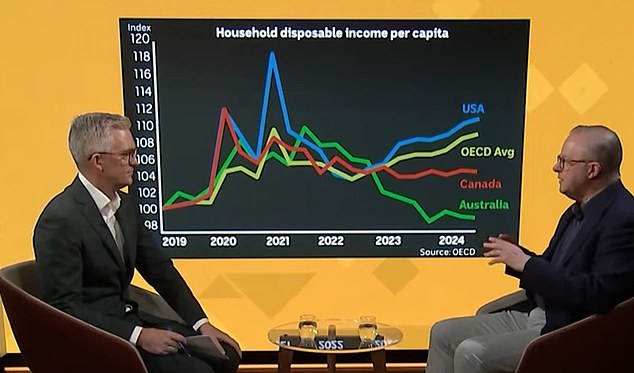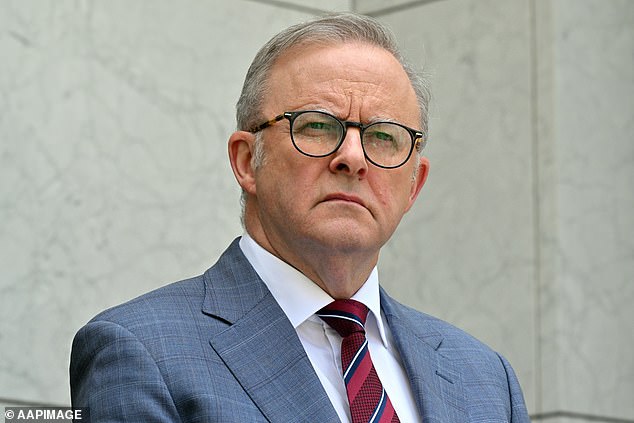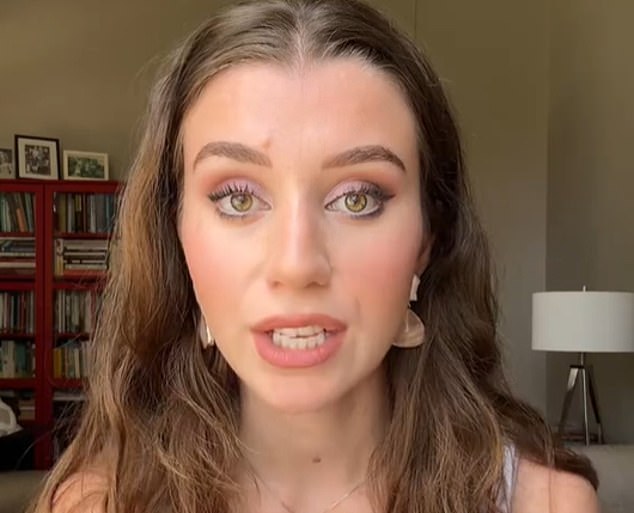A young woman says Australians are “literally poorer” under Anthony Albanese’s government, highlighting alarming figures showing a dramatic drop in disposable income.
Freya Leach, a 21-year-old Conservative activist, called Albanese the “worst prime minister ever” in a video posted on social media.
‘A genuine question. When will people realize that this Anthony Albanese Labor government is terrible? Guys, we are literally poorer. “Inflation is going crazy, businesses are not investing, jobs are not being created,” Ms Leach said.
‘If you don’t believe me, let me give you this point. Australia has had the biggest drop in real disposable income of any country in the developed world.
‘Do you think that happened out of nowhere? You think we just fell off a coconut tree and became poorer.’
Australian households have experienced an eight per cent drop in inflation-adjusted disposable income over the past two years, the OECD has revealed.
Albanese was questioned about the data on ABC’s Insider on Sunday.
Freya Leach, a 21-year-old conservative activist (pictured left) went on a rampage against Anthony Albanese in a video shared on social media.

OECD data shows Australia’s disposable income falling
‘Other countries, Canada, the OECD average, are doing better than Australia in terms of disposable income. Why is that?’ host David Speers asked.
Albanese explained that the graph “tells the story”, highlighting that the timing of inflationary pressures is the key reason Australians are worse off financially compared to people in other countries.
‘Inflation peaked higher and earlier overseas than (in Australia). “Interest rates were higher abroad, inflation was higher and it was earlier,” he explained.
“The impact because of where we are in the supply chain came later here and that’s why inflation, although we inherited it with a six in front when we came to power and rising, is now a two in front and falling.” said Mr. Albanese.
Inflation under the Labor Party government hit a 32-year high of 7.8 percent at the end of 2022, but has since moderated amid 13 interest rate rises.
Ms Leach, director of youth policy at the Menzies Research Institute think tank who ran the Conservative Club at the University of Sydney, also argued that Australians had become poorer as a direct result of the Labor government’s spending.
“This government has spent an extra $315 billion since the last election, fueling inflation,” Ms Leach said.
His comments echo those of the Reserve Bank, which has suggested federal and state government spending was contributing to inflation as Australians ran out of rate cuts.
The futures market does not expect the RBA to cut rates until May next year, even though borrowers in the US, UK, Canada, EU and New Zealand have already had rate cuts this year.
Ms Leach also took issue with Labor reviving employer bargaining in which pay rises are replicated in other workplaces in a sector.
‘Their industrial relations laws have meant that companies don’t want to hire people. It’s just that wages don’t increase anyway, productivity has gone down, and could go on. “This government stinks,” he said.

Albanese has cited the timing of inflationary pressures as the reason Australians are poorer than their counterparts around the world.
Albanese used Parliament’s final sitting week of the year to defend his government, arguing that Labor had inherited “a number of challenges” after winning the 2022 election.
While Labor has delivered two budget surpluses, the Treasury is forecasting a deficit of $28.3 billion by 2024-25 as falling iron ore prices hit government business tax revenues.
Australian productivity growth remains very weak and Australia has been in a per capita recession since early 2023, where the output of every Australian has been declining.
But unemployment remains low: 4.1 percent and wages grew in September at an annual rate of 3.5 percent.
Adjusted for inflation, real wages are only growing 0.7 percent.
While headline inflation is at a three-year low of 2.8 percent, this is the result of one-time $300 rebates on electricity and temporarily cheaper gasoline.
Core inflation, excluding volatile elements, is higher at 3.5 per cent, and above the Reserve Bank’s target of 2 to 3 per cent.
Services inflation is even higher at 4.6 percent, showing that the cost of living crisis is far from over.
Last year, Ms Leach ran unsuccessfully as a Liberal candidate in the green electorate of Balmain, in Sydney’s inner west.

